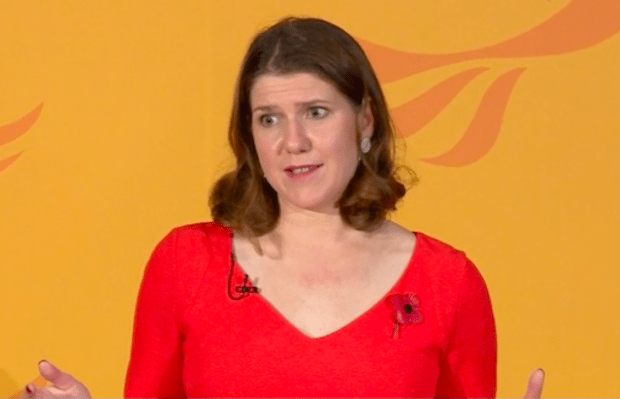Jo Swinson’s ordeal at the hands of Andrew Neil dramatised (painfully) the anguish of being a liberal in an age of populism. The Liberal Democrats are the ultimate fence-sitters, the men too broadminded to take their own side in a quarrel, per Robert Frost’s aphorism. But in this election they have tried to represent the centre while advocating the most extreme position on Brexit.
As Neil pointed out to Swinson on tonight’s BBC One interview, her policy of revoking Brexit without a vote (in the event of a Lib Dem majority government) was so fundamentalist it has proved off-putting even to some Remainers. He suggested this might have contributed to Swinson’s ever-declining favourability ratings, and he’s probably onto something there. This is what we might call Campanella Syndrome, after Jackie Robinson’s quip about Roy Campanella: ‘The more you see of Camp, the less you like him.’ Voters are not averse to the idea of Swinson but when they actually see her on TV, she comes across like a Benenden head girl arranging the annual dance and having to do everything herself because the rest of you squits would just get it wrong anyway.
The revoke policy is an example of the Lib Dems trying to be populists and failing badly. In one sense, this is strange because on the Iraq War, tuition fees and various local issues, they used to be peerless demagogues. The coalition remains their historic error. However much it may have been in the national interest, it was not in the Lib Dem interest. It gave them a record they must run on, or, more accurately, run from. Neil demonstrated this simply but devastatingly by juxtaposing all the Tory nasties the 2019 Lib Dem manifesto promises to banish (bedroom tax, benefit cap) with Swinson’s many votes in favour. There is the cold, deathly inevitability of a hanging judge to Andrew Neil and Swinson winced her way through the charges.
It’s all terribly unfair, of course. Swinson is up against Jeremy Corbyn and Boris Johnson and it’s her record that is an issue. The lesson — and it’s not a pleasant one — is this: the voters will tolerate any outrage, any infidelity, any lie, any association, any vendetta against any minority, but don’t dare ever pick their pocket. How different things might have been if Swinson had brushed aside all references to her record as metropolitan snobbery or a smear cooked up in Tel Aviv.
Admitting that her becoming Prime Minister was ‘not the most likely scenario’ — it was always a ludicrous hostage to fortune — brought Swinson the inevitable question: who would she put in power? She repeated her claims that she wouldn’t crown either Johnson or Corbyn, but, as Neil made clear, this position is unsustainable. If sticking Corbyn in Number 10 meant she got a People’s Vote, no one seriously thinks she would decline.
‘I will vote for legislation to pass a People’s Vote,’ she told him. ‘Of course I will.’ No doubt, but what about in the interim, when Labour puts forward a Queen’s Speech, or a Budget, or faces a confidence vote? Will she honestly withhold the votes? Will her party allow her? If she wants to exercise any influence over Brexit, Swinson will have no choice but to sup eventually with Corbyn. It’s probably for the best that polls show Luciana Berger trailing in Finchley and Golders Green.
It’s a shame the Lib Dems chose to pander to Continuity Remain, which shouts loudly but is unrepresentative of Remain voters let alone the country. The extreme centre has all those QCs and MPs and PhDs but it doesn’t have the votes to impose its anti-democratic huff on the people. Brexiteers may be offended by the Lib Dems’ contempt for their victory in 2016 but many of us on the losing side of that referendum are affronted by the notion that a lawful, democratic mandate ought to be set aside because those who granted it did so in defiance of the clearly stated instructions of the op-ed page of the Financial Times. Lib Dem populism failed this time because it was a populism rallied against the populus.
What struck me most from Jo Swinson’s interview was her plea that, instead of leaving, the UK ‘play a leadership role in the EU’. Whether that has been an option since the adoption of the euro, or even before then, is an open question. But the words stood out because, try as I might, I can’t think of the last time I heard a leading anti-Brexit figure make a positive case for EU membership. Yes, the UK is awful and our economy will collapse without Brussels and we’re a nation of parochialists and Leave voters are all incipient white supremacists, but aside from those calm and rational points, why do Remainers want us to remain?
We made the argument about why we mustn’t leave rather than why we ought to stay, and we lost, and will go on losing, and so will the Lib Dems, until we accept it.







Comments